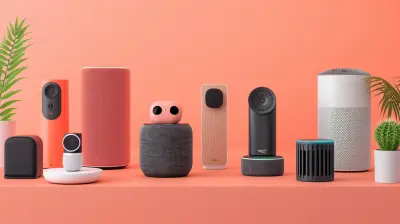Voice Assistant Security: How to Safeguard Your Conversations
26 September 2025
Voice assistants like Siri, Google Assistant, and Alexa have become our personal digital companions. From setting reminders, playing our favorite songs, to controlling smart home devices, they simplify our everyday lives. But, have you ever thought about how secure your voice assistant actually is? Could someone be listening in on your conversations?
It's a scary thought, isn’t it? The idea that your private conversations might not be so private after all. In this article, we are going to dive deep into voice assistant security, how these devices work, the risks involved, and, most importantly, how you can safeguard your conversations.

What Are Voice Assistants?
Before we jump into the security concerns, let's clarify what voice assistants actually are. Voice assistants are AI-powered software programs that can recognize voice commands and respond accordingly. Popular examples include:- Siri (Apple)
- Alexa (Amazon)
- Google Assistant (Google)
- Cortana (Microsoft)
They listen to your commands and perform tasks such as sending texts, playing music, providing weather updates, and even ordering products online. Sounds convenient, right? But all this convenience comes with a significant trade-off: your privacy.

How Do Voice Assistants Work?
Voice assistants rely heavily on voice recognition technology. They are always in a standby mode, waiting for a “wake word” (like “Hey Siri” or “Alexa”) to activate. Once the wake word is detected, the device starts recording your voice and sends that data to the cloud for processing.Here’s a simplified breakdown:
1. Activation: The assistant wakes up when it hears the wake word.
2. Recording: It starts recording your command.
3. Transmission: The recording is sent to cloud servers for interpretation.
4. Response: The assistant processes the request and responds accordingly.
Sounds simple, doesn’t it? But here’s the catch: if these devices are always listening for the wake word, how can you be sure they aren’t listening to everything else?

The Risks: Are Voice Assistants Always Listening?
This is where things get tricky. While voice assistants are designed to only listen after hearing the wake word, there have been reports of devices accidentally activating and recording conversations without the user's knowledge. This could happen due to a misinterpretation of background sounds or even a word that sounds similar to the wake word.For instance, imagine you’re casually chatting with a friend, and you say something that sounds like "Alexa". Without you knowing, your voice assistant might start recording parts of your conversation and send it to the cloud. Scary, right?
Data Collection and Privacy Concerns
What happens to the data after it’s sent to the cloud? This is where privacy concerns escalate. Voice assistants often store your recordings to “improve” their services, but this also means that sensitive information could be saved on servers far beyond your control.Even worse, there have been cases where companies employed human reviewers to listen to these recordings to improve voice recognition systems. Yikes! That means someone might have listened to your private conversations.
What About Hacking?
Another worrying factor is hacking. If someone gains unauthorized access to your voice assistant, they could potentially listen to your conversations, control your smart home devices, or even access sensitive information like passwords or banking details.Hackers have become increasingly creative. With the rise of “voice squatting” and “voice masquerading” attacks, they can exploit voice assistants to trick users into revealing personal information or performing unintended actions.

How to Safeguard Your Conversations
Now that we’ve established the risks, let’s talk about how you can protect yourself. While voice assistants do pose security and privacy concerns, there are several steps you can take to safeguard your conversations and minimize the risks.1. Disable Microphone When Not in Use
The most straightforward solution to prevent unwanted eavesdropping is to disable the microphone when you're not using the device. Most voice assistants, like Alexa and Google Assistant, have a physical button that allows you to turn off the microphone. When disabled, the device won’t be able to listen or record anything.Sure, it’s a little less convenient than having it always ready, but isn’t your privacy worth it?
2. Delete Voice Recordings Regularly
Did you know you can delete the voice recordings stored by your assistant? Most services allow users to review and delete their voice recordings. Here’s how to do it:- Alexa: Go to the Alexa app > Settings > Alexa Privacy > Review Voice History. You can delete recordings from here.
- Google Assistant: Head to your Google Account > Data & Personalization > Activity Controls > Voice & Audio Activity. You can then delete the recordings.
- Siri: Apple doesn’t store voice recordings by default unless you opt-in, but you can disable Siri’s data-sharing feature by going to Settings > Siri & Search > Siri & Dictation History > Delete Siri & Dictation History.
Regularly clearing this data ensures that sensitive information isn’t stored indefinitely.
3. Change Your Wake Word
If you're concerned about accidental activation, consider changing the wake word to something less common. For example, instead of “Alexa,” you could use “Echo” or “Computer.” This reduces the chances of your assistant picking up unintended conversations.4. Enable Voice Match or PIN Authentication
Some voice assistants offer a voice match feature that ensures only recognized voices can access the assistant’s features. For example, Google Assistant can be trained to recognize your voice and only respond to you.Additionally, enabling PIN authentication for sensitive actions like making purchases or accessing personal information adds an extra layer of security. This way, even if someone else tries to use your voice assistant, they won’t be able to perform critical tasks without the PIN.
5. Review Permissions on Connected Devices
Chances are, your voice assistant is connected to several other devices, like smart home gadgets, apps, or even payment methods. It’s important to regularly review the permissions granted to these devices. Ensure that only trusted devices and apps have access to your voice assistant.For example, if you no longer use a particular smart lightbulb or thermostat, revoke its access to the assistant. This minimizes the chances of unauthorized access through connected devices.
6. Regularly Update Your Device’s Firmware
Software updates are crucial for maintaining security. Companies like Amazon, Google, and Apple regularly release firmware updates to patch security vulnerabilities. Make sure your voice assistant’s firmware is always up to date to protect yourself from potential threats.7. Use a Secure Network
Hackers can intercept voice assistant communications if your network isn’t secure. Always use a strong, password-protected Wi-Fi connection, and consider enabling WPA3 encryption if your router supports it. This ensures that your data and conversations are safe from prying eyes while in transit.8. Disable Features You Don’t Use
Most voice assistants come with a host of features that you may never use. If you’re not using certain services, like voice purchasing or location tracking, it’s a good idea to disable them. This limits the amount of personal data the assistant has access to and minimizes potential security risks.9. Be Cautious About Third-Party Skills or Apps
Voice assistants often allow third-party developers to create "skills" or apps, which can enhance the functionality of the assistant. However, not all third-party apps are created equal, and some may pose security risks.Before enabling a third-party skill, make sure it’s from a trusted developer. Check reviews, permissions, and consider whether the skill truly needs access to your data.
The Future of Voice Assistant Security
As voice assistants continue to evolve, so will the security challenges associated with them. Companies are working on improving voice recognition technology, reducing false activations, and enhancing privacy features. However, it’s essential for users to stay informed and proactive in protecting their personal data.Voice assistants aren’t going away anytime soon, and let’s be honest, they’re incredibly convenient. But with convenience often comes risk. It’s up to you to take control and ensure that your conversations remain private.
Conclusion
Voice assistants have undoubtedly become an integral part of modern life, but they also represent a potential vulnerability in our digital privacy. By understanding the risks and taking steps to safeguard your conversations, you can enjoy the benefits of voice assistants without compromising your security.Remember to disable the microphone when not in use, delete voice recordings regularly, and use authentication methods like voice match or PINs. With these precautions, you can limit the chances of eavesdropping and ensure your personal information stays safe.
So, is your voice assistant listening to you right now? Hopefully not—but it’s always better to be safe than sorry.
all images in this post were generated using AI tools
Category:
Voice AssistantsAuthor:

Marcus Gray
Discussion
rate this article
1 comments
Bryce Rogers
Prioritize privacy; choose wisely always.
October 4, 2025 at 12:57 PM

Marcus Gray
Thank you for emphasizing the importance of privacy! It's crucial to stay vigilant and make informed choices when using voice assistants.


